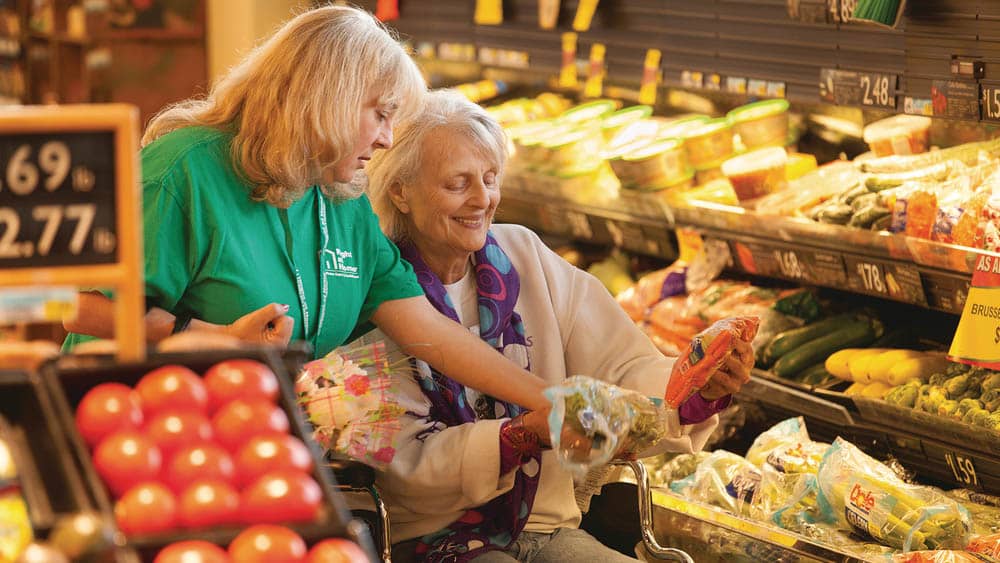

Why Hydration Is Important for Seniors With Dementia and Tips To Ensure Adequate Intake
Staying hydrated is an important but often overlooked part of staying healthy. Studies show that despite campaigns encouraging people to keep hydrated by drinking plenty of water, most Americans continue to fall short of recommended fluid intake levels and are thus chronically dehydrated. The risk of dehydration increases for older adults, and the risk of poor cognitive functioning comes with it. This is exacerbated by a reduced sensation of thirst that comes naturally as a result of the aging process. This fact makes it especially hard for older adults with dementia or the people caring for them to ensure adequate fluid intake is happening.
Why Is Staying Hydrated So Important for Seniors?
Hydration is serious business. Proper hydration promotes improved brain performance, digestion, and healthy weight management. Staying hydrated can improve cognition, stabilize emotions, help manage anxiety, boost energy, decrease joint pain, regulate body temperature, prevent the formation of kidney stones, and reduce the incidence of headaches. It also maximizes the body’s natural detoxification system. Fluids replenish the body, flushing what needs to come out and helping keep everything in a well-lubricated working order.
Lack of adequate fluid intake can contribute to muscle cramping, memory loss, mood swings, lack of concentration, and impaired reaction time. It can also manifest in headaches, confusion, urinary tract infections, and constipation.
But just because an older person doesn’t feel thirsty doesn’t mean they are properly hydrated.
Notice the Signs and Take Action
Because older adults may not recognize or report symptoms of mild dehydration—dry mouth, fatigue, headaches, muscle cramps—they become more prone to developing moderate to severe dehydration, one of whose characteristics—confusion—may be masked if the senior has dementia. Other signs of moderate to severe dehydration, such as dry and sunken eyes, acute muscle cramps, low blood pressure, and mobility problems, should be heeded immediately. Whereas folks with mild dehydration usually make a visible recovery within a few minutes of drinking fluids, individuals with moderate to severe dehydration may require intravenous (IV) fluids.
Hydration Is Especially Important in Those With Dementia
Caregivers need to be extra vigilant regarding the hydration of someone with dementia. A confused mental state that signals dehydration can be missed when ignored or automatically attributed to dementia. Because someone with dementia cannot reliably monitor or manage their own fluid intake, the caregiver must work out a regimen with the senior’s health care team for how much fluid they need and ways to ensure they get it daily.
Never assume the older adult is hydrated just because they don’t help themselves to a drink or ask for a drink. They may forget to drink or not know they’ve gone too long without a drink. Fortunately, there are several signs of dehydration for the caregiver to pay attention to, including:
- Dry mouth
- Dark or pungent urine
- Sunken eyes
- Dizziness
- Weakness
- Agitation
- Constipation
- Bad breath
- Behavioral changes
- Sluggishness
- Muscle cramping or weakness
- Headache
- Nausea
When one or more of these warning signs appear, caregivers are advised to encourage the older adult to drink water or other fluids.
Alcohol doesn’t count as a hydrating fluid; indeed, it works against hydration. Coffee, however, does hydrate the body. Sports drinks are an option, though they often contain excess sugar or sweeteners and are best utilized after strenuous, sweat-inducing activities to replace lost electrolytes.
If an older adult displays any of the following symptoms, take them to an urgent care or ER:
- Confusion that worsens suddenly
- A temperature of 101 F (38.3 C) or higher
- Difficulty breathing
- Rapid heartbeat
- Diarrhea or vomiting
- Chest or abdominal pain
- No urination for eight hours
- Severe cramping
Prolonged dehydration can lead to urinary system infections, kidney problems, seizures, heat exhaustion, or heat stroke.
Hydration Strategies for Family Caregivers
Those helping to care for an aging loved one with dementia can help them avoid becoming dehydrated by implementing some simple strategies:
- Offer fluids throughout the day.
- Keep fresh water or juice within plain sight.
- Bring water on any road trip or to any activity.
- Provide choices other than plain water, such as flavored water, seltzer, club soda, juice, herbal tea, a smoothie, or a nutritional shake.
- Serve foods with high water content, such as fruits, vegetables, yogurt, ice cream, broth-based soups, and stews.
- Have the senior take medications with ample water.
- Incorporate drink breaks into any activity.
- Label beverage containers with reminders to drink up.
- Put fluids in easy-to-handle containers.
- Remind the senior to drink during and after physical activity or when it’s hot and humid.
Experts advise following a schedule for the senior’s fluid intake and charting their progress as much as possible. Experts also recommend keeping their environment calm and sticking to routines.
Caregivers should consider that even though a fluid container used by a senior may be empty, it doesn’t necessarily mean they finished it. The senior may have spilled or poured it out.
Most people need two to three liters or eight to 12 cups of fluid a day. However, recommended intake varies from person to person and by environment—the hotter and more humid a climate, the more fluid intake is needed—and by such things as body weight and activity level. An older person’s primary care physician and dietician can provide individualized guidelines, and a caregiver can adjust this as needed based on the person’s fluid intake habits and preferences.
If achieving adequate fluid intake in a senior is difficult, the caregiver should consult the senior’s health care team for further guidance and support until the right mix or balance is achieved.
How Right at Home Can Help
Right at Home caregivers can help older adults navigate the aging journey and offer a wide variety of homemaking/companionship and personal care services to support them at home. These services include monitoring hydration and escalating any signs of inadequate fluid intake. Caregivers can also help aging adults follow other recommendations from health care providers, including proper meal planning/preparation, ambulation and activity, and monitoring medication intake. To find out more, use our office locator to reach the nearest office and ask for a FREE in-home consultation.
Interested in receiving ongoing tips, information, and advice related to the aging journey? Subscribe to our Caring Right at Home e-newsletter today.







